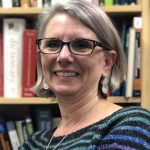
Karen Emmorey
Karen Emmorey, Ph.D.
Dr. Karen Emmorey is a Distinguished Professor in the School of Speech, Language, and Hearing Sciences at SDSU and the Director of the Laboratory for Language and Cognitive Neuroscience. Dr. Emmorey and her team have expertise in functional magnetic resonance imaging (fMRI), positron emission tomography (PET), and brain morphometry (tractography, cortical thickness measures). She uses these techniques, along with behavioral measures, to study the neural cognitive underpinnings of language (both signed and spoken) and the sequelae of congenital deafness. Dr. Emmorey is a high-volume PI and has had continuous NIH and NSF funding for 20 years. She is a Fellow of the American Association for the Advancement of Science and serves on the Editorial boards of four high-impact journals. Dr. Emmorey is the author/editor of four books and more than 100 peer-reviewed journal articles and chapters. Her most recent work focuses on the neural plasticity of the reading circuit in deaf individuals and the impact of deafness on macroscopic neural structures.

Phil Holcomb
Phil Holcomb, Professor Department of Psychology
Dr. Phillip Holcomb is a Professor in the Department of Psychology at SDSU and co-directs the NeuroCognition Laboratory with Dr. Katherine Midgley. Dr. Holcomb’s NIH funded lab has expertise in the use of event-related potentials (ERPs) and uses this technique along with more traditional behavioral measures to study the temporal dynamics of language comprehension in the brain. The lab is particularly interested in understanding how humans comprehend individual words, from over 50,000 alternatives, in less than half a second. This research has application to a variety of real world issues such as a better understanding of the neuro-cognitive mechanisms involved in learning to read as well as a clearer picture of what goes wrong in various language impairments such as dyslexia. Recently the NeuroCognition Lab has become involved in a collaboration with Dr. Emmorey’s and the Laboratory for Language and Cognitive Neuroscience. In this work, funded by both the NSF and NIH, we are using ERPs to track the time course of word comprehension in deaf adults.

Tracy Love
Tracy Love, Ph.D.
Dr. Tracy Love is a Professor of Speech, Language, and Hearing Sciences at SDSU and a Research Scientist at UC San Diego. Dr. Love’s expertise is in the cognitive, linguistic and neurological underpinnings of language processing in both unimpaired and clinical populations. Her research includes work with adult stroke survivors with resulting aphasia, children with specific language impairment and those diagnosed on the autism spectrum. She employs numerous research methods in her investigations, including fMRI, perfusion mapping (cerebral blood flow), eye tracking and pupillometry, evoked response potentials (ERPs), and behavioral measures. Her work has focused on examining the nature of the information used during on-going language and cognitive processing, in determining when and how different information sources are integrated, and in determining the biological (neurological) bases of these processes. Along with Dr. Shapiro, she co-directs The Language and Neuroscience Group Laboratory where currently six doctoral, 10 Masters and 15 undergraduate students are mentored. Dr. Love has received continuous funding through NIH for over 10 years, has published over 30 peer-reviewed papers, 8 invited chapters and over 90 peer-reviewed and invited presentations.

Sarah Mattson
Sarah Mattson, Ph.D.
Dr. Sarah Mattson is a Professor of Psychology at SDSU and a clinical neuropsychologist with expertise in behavioral teratology, specifically in the effects of heavy prenatal alcohol exposure. She is also Associate Director of the SDSU Center for Behavioral Teratology, a campus-wide center focused on the brain and behavioral effects of heavy prenatal alcohol exposure and other developmental disorders. Dr. Mattson has been conducting neuropsychological and neuroimaging research, particularly on fetal alcohol spectrum disorders, for over 20 years. Her recent work also incorporates attention-deficit/hyperactivity disorder. She currently serves on the National Advisory Council to the National Institute on Alcohol Abuse and Alcoholism and on the editorial boards for 3 high-impact journals. Dr. Mattson is a high-volume PI and has had continuous NIH research funding since 1997, with total costs of over $10 million. She currently directs two federally funded research projects on fetal alcohol spectrum disorders and a smaller, unfunded study of the neuropsychological and behavioral features of a rare genetic disorder, 11Q terminal deletion disorder (Jacobsen syndrome). She is the author of over 90 peer-reviewed publications and 14 book chapters.

Ralph-Axel Müller
Ralph-Axel Müller, Ph.D.
Dr. Ralph-Axel Müller is a Professor of Psychology at SDSU and a cognitive neuroscientist, who has specialized in functional brain imaging of neurodevelopmental disorders and typical child development for 20 years. He is Director of the Brain Development Imaging Laboratory at SDSU, which studies children and adolescents with autism spectrum disorders as well as typically developing children, using a wide array of brain imaging techniques, such as functional and functional connectivity MRI, anatomical MRI (volumetrics), diffusion tensor imaging and tractography, and MR spectroscopy (chemical shift imaging). Additional techniques are applied through collaborations with various groups on the SDSU campus (e.g., data-driven analysis techniques in collaborations with Computational Science and Biomedical Informatics programs) and with UCSD (e.g., EEG, MEG, eye-tracking, restriction spectrum imaging for in vivo cytoarchitectonics). Dr. Müller has received continuous R01 funding from NIH since 2001, with total funding exceeding $6M. Current autism projects include the study of brain network abnormalities using multimodal MRI, the study of brain changes in response to neurofeedback training, and the combined use of MRI and electrophysiological techniques (EEG, MEG) for dynamic studies of brain connectivity. Dr. Müller’s work has resulted in over 60 peer-reviewed journal articles and twelve books and invited book chapters on autism spectrum disorders and the neurobiological bases of language.

Ignatius Nip
Ignatius Nip, Ph.D., CCC-SLP
Dr. Ignatius Nip is an Associate Professor in the School of Speech Language and Hearing Sciences at SDSU and directs the Speech Physiology Laboratory. His research examines the speech motor control of children and adults with motor speech disorders secondary to cerebral palsy, Parkinson’s disease and oropharyngeal cancer and how language affects speech movements. Dr. Nip is also interested in translating our understanding of speech movement differences in people with motor speech disorders to clinical applications, including new treatment paradigms and predicting which individuals might respond best to an intervention. His research has been funded by the American Speech-Language-Hearing Foundation and NIH.

Recent Comments